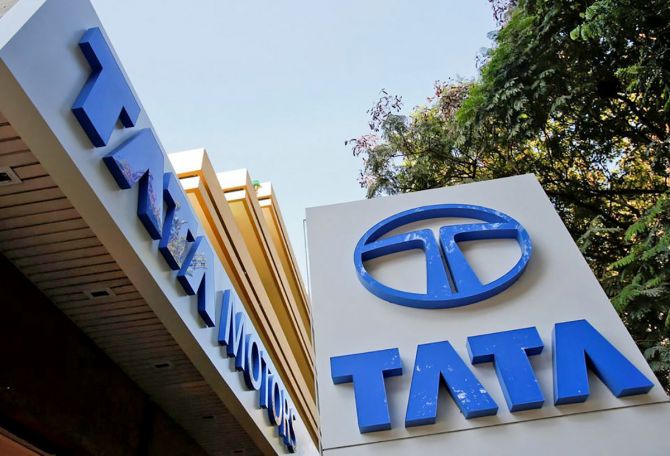'Favourable product mix, sales recovery, and cost saving initiatives are expected to support margins going ahead while focus on debt reduction (target of debt free by FY24) will aid balance sheet strength'

Shares of Tata Motors entered fast lane, zooming 12 per cent intra-day to Rs 416 apiece on the BSE on Friday, as investors eyed long-term growth plans by the Tata Group company despite a mixed March quarter (Q4FY22) result. The shares ended 8.7 per cent higher on the BSE at Rs 404 per share as against a 0.26 per cent dip in the benchmark S&P BSE Sensex.
Analysts believe Tata Motors is witnessing an improvement in all business verticals -- JLR, Commercial Vehicles, and Passenger Vehicles -- with the second half of fiscal 2021-22 (H2FY22) seeing strong volume growth and better operational efficiencies aided by aggressive launches, market positioning, product differentiation, cost savings, and investments in R&D.
Given this, brokerage firm Sharekhan expects operational performance to improve strongly in fiscal 2022-23 (FY23), as supply constraints are expected to ease gradually, while demand continues to remain strong for both JLR and domestic operations.
"Driven by an all-round strong performance, we expect Tata Motors to become earnings' positive in FY23 with a net profit of Rs 7,068 crore, driven by robust sales growth and improving margins," it said.
Those at JM Financial further added that favourable product mix, sales recovery, and cost saving initiatives are expected to support margins going ahead while focus on debt reduction (target of debt free by FY24) will aid balance sheet strength.
"In addition, Tata Motors' electric vehicle (EV) portfolio is leading the domestic EV space and by securing strategic investors, it is well poised to build on its initial success," it added.
Separately, analysts also expect Tata Motors to witness a gradual recovery as supply-side issues ease and commodity headwinds stabilise (for the India business).
"We estimate FY22-24 India CV/PV volume CAGRs of 17 per cent/18 per cent, driven by the continuation of an industry sales upcycle, new products and better chip supplies. The focus remains on E-PVs, with medium-term investments of $2 billion toward new products, capacity expansion, localization and charging infra," said Emkay Global.
Earnings' estimate trimmed post Q4
That said, analysts have trimmed their earnings estimate post the March quarter result to factor-in near-term headwinds.
Emkay Global has reduced FY22E/23 consolidated Ebitda by 7 per cent/5 per cent, mainly due to lower JLR volumes. Those at Motilal Oswal Financial Services have cut their FY23/FY24 consolidated EPS estimate by 12 per cent each.
Tata Motors' consolidated revenue fell 11 per cent year-on-year to Rs 78,439 crore, while earnings before interest, tax, depreciation, and amortization (Ebitda) fell 31 per cent YoY to Rs 8,740 crore.
Consolidated Ebitda margin came in at 10.6 per cent (down 380bps YoY, up 80bps QoQ) driven by better margin performance at Jaguar Land Rover (JLR). JLR reported margin of 12.6 per cent (down 270bps YoY, up 200bps QoQ), while India business Ebitda margin stood at 6.5 per cent driven by improved volumes and higher net realisation.
Overall, its consolidated net loss narrowed to Rs 1,033 crore for the quarter ending March 31, 2022.
"Despite management's efforts, net consolidated auto debt has increased YoY to Rs 48,700 crore in FY22 from Rs 40,900 crore in FY21. JLR's target to achieve over 7 per cent Ebit margin by FY24 and over 10 per cent by FY27; market share gain in key geographies; and becoming net debt free by FY25 appear highly ambitious," noted HDFC Securities.
The, it said, is because market share gains are difficult to achieve as JLR lags global peers in EV transition; EV transition for all global peers is expected to be margin dilutive; and all global luxury peers are pushing harder for investments in evolving technologies.
"We see near term incremental margin pressures for JLR, given the China slowdown and unabated supply constraints. As a result, we have lowered our estimates by 9 per cent each for FY23/24," it added.











 © 2025
© 2025